Religious freedom watchdog groups are accusing the Chinese Communist Party (CCP) of using the Wuhan coronavirus epidemic as an opportunity to intensify their crackdown on religion, bulldozing some churches and placing others under heavy surveillance.
“China is now holding itself up as a model for fighting the coronavirus. But fighting the pandemic hasn’t stopped communist officials from persecuting Christians,” Todd Nettleton, a spokesman for the nonprofit group Voice of the Martyrs (VOM), told Fox News on Tuesday.
Another prominent activist, Bob Fu of China Aid, shared a video of Chinese officials demolishing a church in the city of Yixing:
Other churches have reportedly been vandalized by Chinese officials and orders have been given that effectively ban “unregistered” religious services on the grounds of public health. On the bright side, VOM saw the prevalence of medical masks due to the coronavirus as an opportunity to evade China’s pervasive facial-recognition systems and proselytize with less fear of being identified and persecuted.
Buddhists and Taoists also reported the suppression and demolition of their temples, a process that appeared to be intensifying just as the coronavirus exploded out of Wuhan. Worshipers bitterly noted that local officials have a habit of abruptly deciding that temples built with their approval failed to meet some obscure building code and must be demolished immediately. Not even hoisting Communist flags and papering temples with posters of China’s authoritarian ruler Xi Jinping was enough to save the targeted temples.
“Unconditional cooperation with the government means that no photos of the demolition can be taken, no negotiations initiated, and no compensation demanded. This is typical behavior of the CCP government,” one Buddhist complained to the Bitter Winter human rights website.
“The Communist Party is as evil as a mafia. Under the tyranny of those modern bandits, even sacred Buddhist temples cannot enjoy peace,” said another.
Churches that do not get knocked flat are encrusted with surveillance cameras to terrorize the congregations, and perhaps build up “evidence” of incorrect speech that can be used as an excuse to wipe out the church, as detailed in another Bitter Winter post:
According to a Three-Self preacher from Lankao county in Henan’s Kaifeng city, powerful cameras, over 10,000 RMB (about $ 1,400) each, have been installed in at least eight Three-Self churches, images from which are displayed on a large screen in the hall of the county’s Two Chinese Christian Councils. Who leads Sunday services, what sermons are about, and how many congregation members are present—everything is under the government’s close surveillance.
“The surveillance equipment is powerful; it can catch every single word in the church,” a Three-Self church director in Lankao county explained. “We can get into trouble for making an incautious remark. Believers don’t dare to even chitchat with each other under such surveillance.” He once received a phone call from a local official less than one hour after he complained about the government.
In August 2019, over 100 cameras were installed in several Three-Self churches in Yi’nan county in Linyi, a prefecture-level city in the eastern province of Shandong. A local government insider revealed to Bitter Winter that the Religious Affairs Bureau and United Front Work Department use the cameras to monitor activities in churches, and those refusing to have cameras installed would be shut down.
As some preachers and church directors learned to their cost, unplugging the security cameras is treated as a crime and swiftly punished by arrest, interrogation, confiscation of church property, and possibly destruction of the church, or even the personal residence of the preacher. According to several sources in China, the CCP now grades churches on a 100-point scale of obedience, deducts points for offenses such as improperly-displayed Communist flags and slogans, and shuts houses of worship down if their score falls under 60.

COMMENTS
Please let us know if you're having issues with commenting.